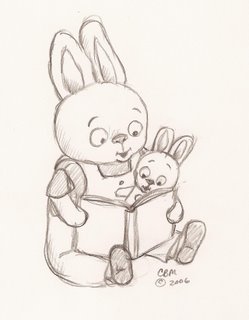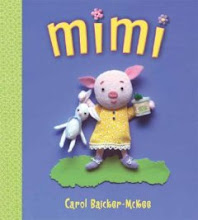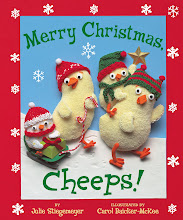
I've been rereading A Tree Grows in Brooklyn by Betty Smith, originally published in 1943 by Harper and Brothers. I'm enjoying it even more than I did the first time. (Hardly surprising since that time I read it cover to cover in a single day. It was a school assignment and I had -- shocker! -- procrastinated about starting it.)
At any rate, nearly every page contains something that makes me think, reminds me of my own childhood, or tugs at my emotions. One of my favorite parts so far is when the protagonist, Francie Nolan, is born and her young poor mother laments that she has no way to make a better life for her child. Grandma responds, "Nonsense!" and proceeds to dispense some of the best universal parenting advice I've come across. I've decided to paraphrase it in installments, along with my thoughts.
First, says Grandma, "The secret lies in the reading and writing." She recommends reading a page daily from a good book to the child so that the child will grow up knowing what is great. The two "good books" she recommends are Shakespeare -- because the plays teach all the wonder of life, beauty, and wisdom there is to know, and because its language sings -- and the Protestant Bible (even though the Nolans are Catholic) because "it contains more of the loveliness of the greatest story on this earth."
I couldn't agree more about reading to your child daily, beginning at birth. Not only will it motivate and prepare your child to become a good reader (lots of research to support that), but good children's books help kids learn how to deal with their emotions, solve problems, or just have fun -- and reading time gives kids and parents a time to concentrate on one another. (Not that reading time is always the quiet, snuggly time that most of us romantically envision. I remember that my babies squirmed and chewed on their books as much as they cuddled and listened, and the big kids often bounced, paced, doodled, and played with "figures" while I read.)
I've yet to hand out copies of Shakespeare or the Bible as new baby presents, but I frequently give the three books my own grandmother, Kee, considered essential for the nursery: a copy of Mother Goose rhymes (my favorite versions are the ones edited by Iona Opie and illustrated by Rosemary Wells: My Very First Mother Goose and Here Comes Mother Goose both from Candlewick Press), Goodnight Moon by Margaret Wise Brown and illustrated by Clement Hurd, and the interactive classic Pat the Bunny by Dorothy Kunhardt. Those three books together introduce baby to beautiful language, address the fundamental issue of separation, and provide some fun to share.
Now I've got to think about my can't-miss choices for kids at other ages. I'll add these to future posts. I also welcome any suggestions about best books for kids (and adults).




















2 comments:
This is great! I am an American living in England, and by profession, a Children's / School Librarian. Currently working in a public library in the UK, we have a program called Bookstart here which aims to distribute free books to children at 9 months, 2 years, 3 years and 4 years old, with handy tips for parents about the important of reading to young children!
I love your new book Cheep! Cheep! by the way and have nominated it for the Greenaway Award (which is the UK's version of the Caldecott!)
Thank you so much! I feel so honored I can't feel the earth beneath me. Kate Greenaway has been a beloved illustrator of mine since my own childhood, and some of my all time illustrators have won that award, like Shirley Hughes and Helen Oxenbury.
I've brought Bookstart to the attention of the UK Bloomsbury folks, and I'd love to make a donation myself if you pass along the information on how to do so. I support a similar organization in my hometown of Pittsburgh, called Beginning with Books. These kinds of organizations make a big difference in the lives of many children and families, and they do so for a fraction of the cost of other intervention programs. Please, everyone, support these programs in your own hometowns.
Post a Comment